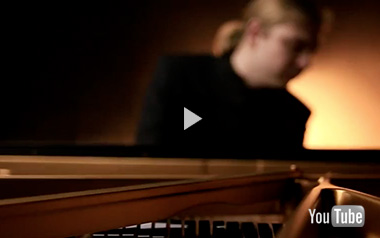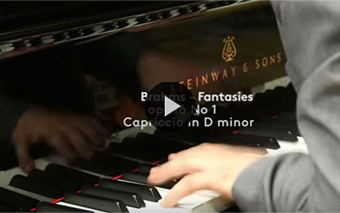Next Concerts
Oct 30, 2024
Leipzig Chamber Music Festival
Leipzig, Germany
Programme to be confirmed
Venue: Gewandhaus Leipzig
Nov 4, 2024
Orchestre Philharmonique du Luxembourg
Barcelona, Spain
Gershwin: Concerto for piano, in F major
– Luxembourg Philharmonic (ensemble)
– Gustavo Gimeno (conductor)
Venue: Palau de la Música Catalana, Barcelona, Spain
REVIEWS
Mar 15 2022
A powerful Kozhukhin for a brilliant Rachmaninov festival
“The Russian pianist, mentored by Dmitri Bashkirov, presented from the very first moment what his interpretative basis would be. On one hand, a bright, shimmering, majestic sound, overflowing with energy and with the power to solve the chords and octave passages so characteristic of this Second Piano Concerto. On the other hand, an expressive elegance that allowed him to delve into the slow passage of the second movement of the Concerto with a contemplative romantic poetry, beautiful in diction and elegant in the line.”
“Kozhukhin’s temperamental pianism could be reminiscent of Ashkenazy’s, express the magic surrounding Eliso Virsaladze’s versions and even bring us closer to that majestic vision that pianists like Trifonov, Berezowsky, Toradze and Yuja Wang have presented us.”
“Memorable reading of Piano Concerot No. 4 –with the very well-measured orchestral balance–, this interpretative courage and the technical complexities required by this orchestral page came together in a version full of fervor and energy. From Kozhukhin we are captivated by the roundness of sound – a fact closely linked to Bashkirov – but also by the romantic conception and not at all sweetened when facing the slow passages. His articulation has an exact precision (brilliant the last movement) and the vigorous, emboldened conception of this Fourth Piano Concerto, which seduced us by a wide range of sound dynamics achieved with a notorious synchronization with the Barcelona Symphony (conducted by Matthias Pintscher).”
“The Piano Concerto No.1, a seductive work that has a final movement of great technical demand, was brilliant, with a Kozhukhin of millimetric precision in the attacks, very elegant in the phrasing and posing a Rachmaninoff of a great strength, but never overwhelming. His pianism went through a multitude of registers, although the colours he obtained in the third movement seduced us by the explosiveness in the attacks and a volume that transported us to some of his Preludes or Tableaux-Etudes.”
“Fantastic the Barcelona Symphony, as it was on Sunday morning the passionate version that Kozhukhin offered us of the famous and much feared (with permission from the fourth in the series) Piano Concerto No. 3.The Russian pianist was eloquent, determined to continue a vigorous reading and with solo passages full of jumps, octave sequences and chords drums rising grandly throughout the room of the Auditorium. A very powerful version -which reminded us of the legendary Arcadi Volodos – and which maintained a constant magnetism throughout the performance. Kozhukhin never gave up on his momentum, with a good orchestral ensemble, conducted by Kazushi Ono, offering beautiful dialogues with the musicians of the orchestra.”
Jan 30 2020
Denis Kozhukhin, QEH review – lyric mastery and subtle elegance
“In Beethoven anniversary year, there will probably be many more “Moonlight”s, meaning the Sonata, than the real thing (though we’ve been lucky to see the crescent in close conjunction with Venus these past two nights). Not many pianists would dare to place it at the beginning of a programme. Denis Kozhukhin’s paradoxically no-nonsense poetry meant that a constant sense of motion culminated in the whirlwind of the finale, a steady move towards implosion mirrored in the piano transcription of Ravel’s La Valse at the end of the programme. In between came perfection in the form of pure song from Schubert and Grieg.”
Nov 14 2019
Mendelssohn Piano Concerto No. 1 / BBC Philharmonic / cond. Joana Carneiro
Jul 15 2019
Album review on The Classic Review on “Grieg: Lyric Pieces / Mendelssohn: Lieder ohne Worte”
Read the full review on The Classic Review.
Jul 12 2019
Album review on NDR Kultur: “Grieg: Lyric Pieces / Mendelssohn: Lieder ohne Worte”
Jun 18 2019
Brahms Piano Concerto No. 1 / Royal Philharmonic Orchestra / cond. Vasily Petrenko
Read the full review on TheArtsDesk.com
Jun 18 2019
Brahms Piano Concerto No. 1 / Royal Philharmonic Orchestra / cond. Vasily Petrenko
Read the full review on Bachtrack.com


